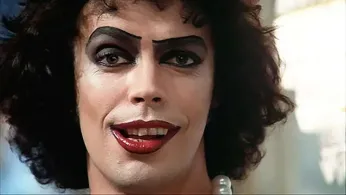
3 hours ago
Tim Curry’s “Vagabond: A Memoir” Illuminates a Trailblazing Career and LGBTQ+ Legacy
READ TIME: 3 MIN.
Tim Curry’s “Vagabond: A Memoir” arrives at a pivotal moment, coinciding with the 50th anniversary of “The Rocky Horror Picture Show”—a film that forever changed the landscape of LGBTQ+ representation in pop culture. The memoir, published by Grand Central Publishing, is a testament to Curry’s expansive career and his unique ability to bring complex, multifaceted characters to life, resonating with audiences across generations.
Curry’s rise to fame began with the stage production of “The Rocky Horror Show,” where he crafted the now-iconic role of Dr. Frank-N-Furter—a self-described “sweet transvestite from Transexual, Transylvania”—and then immortalized it in the 1975 film adaptation. The book delves into how Curry approached this boundary-pushing character, blending flamboyant camp with genuine vulnerability, and how the film’s cult status helped pave the way for greater visibility of gender-nonconforming and transgender people in media.
“Vagabond” provides an intimate look at the realities of Curry’s profession, eschewing tabloid gossip in favor of thoughtful reflection. Curry recounts his beginnings as a military brat, his formative years at boarding school and university, and the challenges of working both on stage and screen. His account includes the creation of Frank-N-Furter, the intricacies of voice work, and the physical demands of sustaining a career that spanned over five decades.
The memoir also explores his acclaimed work in productions such as “Clue,” “Spamalot,” and “It,” where he played Pennywise the Clown. Notably, Curry discusses how he avoided typecasting by choosing projects that challenged norms and showcased his versatility. He reflects on his approach to acting—drawing from personal experience to add depth to every role—and offers candid insights about working in the entertainment industry as someone who defied traditional expectations.
At the heart of “Vagabond” is Curry’s legacy as an artist whose work has deeply influenced LGBTQ+ culture. “The Rocky Horror Picture Show” remains a touchstone for queer audiences, praised for its celebration of self-expression and subversion of gender roles. Curry’s portrayal of Frank-N-Furter was groundbreaking, offering many LGBTQ+ viewers a rare opportunity to see themselves reflected on screen at a time when such representation was scarce.
Curry’s memoir acknowledges the film’s importance in the community but also highlights the challenges faced by performers who take on such iconic, queer-coded roles. He shares how audience reactions shaped his understanding of visibility and acceptance, and how the character’s popularity at midnight screenings helped foster a community where LGBTQ+ people could celebrate their identities openly. Curry’s reflections resonate with the ongoing conversation about representation in media and the importance of authentic storytelling.
A significant portion of “Vagabond” is devoted to Curry’s recovery after a catastrophic stroke in 2012, which left him partially paralyzed. He writes candidly about the impact of disability on his career and personal life, the challenges of adapting to new limitations, and the support of friends, family, and fans. Curry’s experience underscores the intersectionality of identity—reminding readers that LGBTQ+ artists with disabilities also deserve visibility and respect.
Despite these hardships, Curry continued to work in voiceover and participated in select public events, including anniversary celebrations for “The Rocky Horror Picture Show.” His memoir details how he found new meaning in quieter pursuits, such as gardening and home restoration, and how he adapted his creative process in the wake of life-altering circumstances.
“Vagabond” stands out for its introspective tone and Curry’s refusal to sensationalize his personal life. While the memoir avoids gossip, it is rich in anecdote and analysis, offering readers a window into the discipline and creativity required to forge a lasting career in entertainment. Curry’s writing is accessible and honest, demonstrating humility and gratitude for the opportunities he has had, and for the audiences who have supported him over the years.
For LGBTQ+ readers, the memoir is especially meaningful, reaffirming the importance of visibility and self-acceptance. Curry’s legacy is not limited to his performances but extends to his role as a catalyst for change in how queer and gender-nonconforming people are portrayed and understood in mainstream culture.
As “The Rocky Horror Picture Show” marks its 50th anniversary, Curry’s memoir arrives as both a celebration and a call to honor the contributions of LGBTQ+ artists whose work has shaped the cultural landscape. Anniversary events worldwide continue to draw new audiences, with Curry’s performance at their core. The memoir provides a timely reminder of the film’s enduring relevance and the importance of embracing diversity in storytelling.
Curry’s reflections in “Vagabond” encourage readers to look beyond the surface of his characters and recognize the humanity and courage at the heart of his work. His story is one of resilience, creativity, and the ongoing quest for authenticity—values that continue to inspire both the entertainment industry and the LGBTQ+ community.






